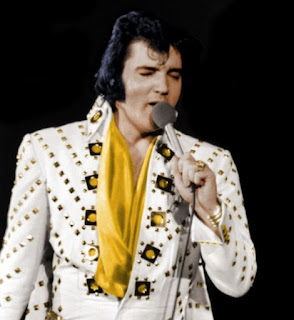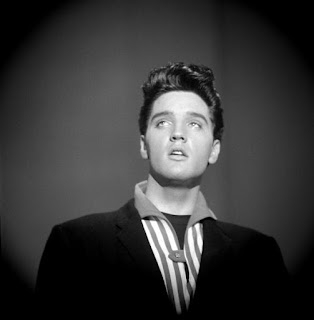Where were you when Elvis died? That's what we'll be talking about in the future when we remember this grand occasion. Like Pearl Harbor or JFK's assassination, it boiled down to individual reminiscences. Why all our public heroes seem to reinforce our own solitude? Elvis was into marketing boredom when Andy Warhol was still doing shoe ads. That "Having Fun with Elvis On Stage" album released three or so years back consisted entirely of between-song onstage patter so redundant it would make both Willy Burroughs and Gert Stein blush. Now he's gone, who's left they can stand all night in the rain for? Nobody, and the true tragedy is the tragedy of an entire generation which refuses to give up its adolescence. Elvis was the last of our sacred cows to be publicly mutilated; everybody knows Keith Richard likes his junk, but when Elvis went onstage in a stupor nobody breathed a hint of "Quaalude...." In a way, this was both good and bad, good because Elvis wasn't encouraging other people to think it was cool to be a walking Physicians' Desk Reference, bad because Elvis stood for that Nixonian Secrecy-as-Virtue which was passed off as the essence of Americanism.
I got the news of Elvis's death while drinking beer with a friend and fellow music journalist on his fire escape on 21st Street in Chelsea. As I left the building I passed some Latin guys hanging out by the front door. "Heard the news? Elvis is dead!" I told them. They looked at me with contemptuous indifference. So What. Maybe if I had told them Donna Summer was dead I might have gotten a reaction; I do recall walking in this neighborhood wearing a T-shirt that said "Disco Sucks" with a vast unamused muttering in my wake, which only goes to show that not for everyone was Elvis the still-reigning King of Rock 'n' Roll, in fact not for everyone is rock 'n' roll the still-reigning music. By now, each citizen has found his own little obsessive corner to blast his brain in: solipsism's what the seventies have been about, and nowhere is this better demonstrated than in the world of "pop" music. How precious the instant Elvis sauntered onto the stage. He was the only male performer I have ever seen to whom I responded sexually; it wasn't real arousal, rather an erection of the heart, when I looked at him I went mad with desire and envy and worship and self-projection. I mean, Mick Jagger, whom I saw as far back as 1964 and twice in '65, never even came close. Lenny Bruce was hip, too goddam hip if you ask me, which was his undoing, whereas Elvis was not hip at all.
Elvis was a goddam truck driver who worshipped his mother. Sexual chaos reigns currently, but out of chaos may flow true understanding and harmony, and either way Elvis almost singlehandedly opened the floodgates. The rest of us are still reeling from the impact. Literally, every time this man moved any part of his body the slightest centimeter, tens or tens of thousands of people went berserk. Not Sinatra, not Jagger, not the Beatles, nobody you can come up with ever elicited such hysteria among so many. If Love truly is going out of fashion forever, which I do not believe, then along with our nurtured indifference to each other will be an even more contemptuous indifference to each others' objects of reverence. I thought it was Iggy Stooge, you thought it was Joni Mitchell or whoever else seemed to speak for your own private, entirely circumscribed situation's many pains and few ecstasies. We will continue to fragment in this manner, because solipsism holds all the cards at present; it is a kingdom whose domain engulfs even Elvis's. But I can guarantee you one thing: we will never again agree on anything as we agreed on Elvis. So I won't bother saying good-bye to his corpse. I will say good-bye to you. —"How Long Will We Care?" by Lester Bangs (Village Voice, August 29, 1977). Article also collected as "Where Were You When Elvis Died?" in Psychotic Reactions and Carburetor Dung (1987) by Greil Marcus
Elvis was a goddam truck driver who worshipped his mother. Sexual chaos reigns currently, but out of chaos may flow true understanding and harmony, and either way Elvis almost singlehandedly opened the floodgates. The rest of us are still reeling from the impact. Literally, every time this man moved any part of his body the slightest centimeter, tens or tens of thousands of people went berserk. Not Sinatra, not Jagger, not the Beatles, nobody you can come up with ever elicited such hysteria among so many. If Love truly is going out of fashion forever, which I do not believe, then along with our nurtured indifference to each other will be an even more contemptuous indifference to each others' objects of reverence. I thought it was Iggy Stooge, you thought it was Joni Mitchell or whoever else seemed to speak for your own private, entirely circumscribed situation's many pains and few ecstasies. We will continue to fragment in this manner, because solipsism holds all the cards at present; it is a kingdom whose domain engulfs even Elvis's. But I can guarantee you one thing: we will never again agree on anything as we agreed on Elvis. So I won't bother saying good-bye to his corpse. I will say good-bye to you. —"How Long Will We Care?" by Lester Bangs (Village Voice, August 29, 1977). Article also collected as "Where Were You When Elvis Died?" in Psychotic Reactions and Carburetor Dung (1987) by Greil Marcus
At his first-ever concert hall performance in New York City, his series of four Madison Square Garden shows in June 1972, he bounded onstage in a white sequined outfit complete with a series of tableau poses. Energizing the audience with a mélange of early material and recent hits, his 45-minute show drew mothers and daughters, along with laments by some critics that despite the breadth of his talent, Elvis the rocker had become Elvis the crooner. For the 80,000 fans that witnessed his New York concerts, he was “a visiting Prince from another planet.” There were indeed adoring teenagers by the legion, but his natural shyness, and perhaps a belief that it “was all just showbiz,” told him that it wasn’t Elvis Presley they were adoring; it was just the image. He would poke fun at that image, amused at the caricature he presented on stage, apt to tell the audience, “Here I am in this Superman outfit.” It’s an honesty that appeals to many. In July 1972 he was introduced to a new girlfriend, Linda Thompson, who reigned as Miss Tennessee. He would also begin dating another beauty queen, Memphis actress Cybill Shepherd.
While Presley on stage was a writhing mass of sensuality, offstage he was humble, polite and he never took advantage of who he was. That contrast would prove to be dynamite. “Up until he went into the army,” Red West remembers: “Elvis was only involved with two real girlfriends, both Southern, charming and very pretty. One was Dixie Locke and the other lady was Anita Wood. He still had some pretty strict rules when dealing with women. He would never tolerate any of the guys around him cussing in front of ladies, and he would really get turned off if any of his friends went with a married lady or even a divorced lady.” Presley was particularly generous to his female friends.
Presley met Linda Thompson in 1972, soon after his break-up with Priscilla. A friend of Presley’s, George Klein, a former Memphis disc jockey, introduced them. Linda impressed the boys as extremely religious when they first met her. “It took a heck of a lot of work for Elvis to get her to move in with him.” The West boys remembered, however, that Linda was not shy about receiving gifts from Presley. “She had more clothes than Elizabeth Taylor. Whenever she traveled she had many suitcases with her. I have known her to go into Georgio’s in L.A. and buy a dozen dresses, and that is one very expensive store.
Also in Las Vegas, she would shop at Suzie Creamcheese and buy a dress in every color. Her jewelry is something else again. Elvis has given her at least a quarter of a million dollars in jewelry, and that is a modest estimate. He has also bought her family a house in Memphis and he has got her a beautiful apartment in Los Angeles.” In 1974, Presley was introduced by Joe Esposito to Sheila Ryan, an incredibly pretty girl from Chicago. “He often would alternate taking them on tour with him,” Sonny West recalls. “One time he would take Linda, then the next time he would take Sheila. If ever Linda made a fuss, I would always hear Elvis tell her over the telephone, ‘Woman, take that knife out of my damn back.’” While still dating Linda, the boys remember that Presley introduced Sheila Ryan to a Las Vegas audience as his girlfriend and asked her to show off her new diamond ring.
In January of 1978, Vernon Presley was interviewed by Good Housekeeping magazine. Vernon had this to say, "I never got to know Ginger Alden well. She's not much of a talker, but awhile back Elvis told me he'd fallen in love with her. 'This is the love I've been searching for,' he said. 'I want more children, a son. And I want Ginger to be my children's mother.' After that, Ginger and Elvis came over to show me her engagement ring. That was one of the few times I'd ever seen her smiling. I assumed they were going to get married. Finally, just a day or so before he died, I told him, 'I keep hearing and reading that you're going to announce your engagement. Is that right? When are you going to get married?' 'Only God knows,' Elvis said." —"Elvis Presley, Reluctant Rebel" (2011) by Glen Jeansonne & David Luhrssen


































































